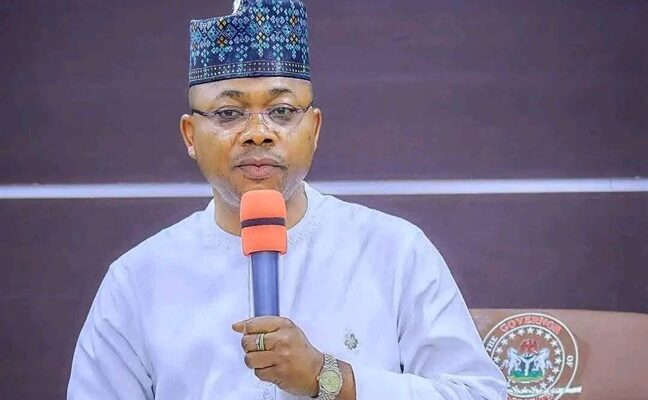In Nigeria’s volatile dramaturgy of governance, where cynicism is the first language of the governed, it is rare to stumble upon a scene that stirs reflection rather than revulsion. Walking into a public office in Kogi State recently, I was struck not by the usual atmosphere of weariness and curses, but by an oddly reverent murmur: “Pray for Governor Usman Ododo.” For years, those same corridors were steeped in profanities, where every mention of government was accompanied by imprecations, swearing, and lamentations. But here was something almost unthinkable — civil servants invoking blessings, not curses.
When i asked, why the prayers? One of them replied saying “He neither owe nor delay our salaries, that is why we are praying for him.”
This inversion, however modest, carries a symbolic weight far heavier than the words themselves. It suggests that, for the first time in a long season of betrayal, public officials perceive a semblance of hope, however fragile. And when I hear good things, I appreciate them — not as many think that I only criticize. There is, in fact, a profound civic duty to acknowledge glimmers of light, even as one exposes the enveloping darkness. To recognize a breath of sincerity in a suffocating atmosphere of duplicity is not naiveté but an act of intellectual honesty.
Yet this moment of whispered prayers reveals more about Nigeria’s wounded political psyche than it does about the man at the center of them. Ododo, still early in his tenure, has not yet authored a grand legacy. But the very fact that he inspires murmurs of intercession rather than volleys of invective shows just how abysmally low the expectations of leadership have been set. Elsewhere, leaders are judged by the visible scaffolding of justice and progress, by the sturdiness of policy, by the reach of social welfare, and by the efficiency of public service. In Nigeria, however, the mere absence of curses becomes a miracle worthy of prayer.
This phenomenon reflects a deeper national malaise — the domestication of despair. Nigerians have been so brutalized by political perfidy that even modest gestures of decency are exalted as monumental achievements. To have a governor who has not yet provoked mass curses is celebrated as though an epochal transformation were unfolding. It is akin to applauding a surgeon not for saving a patient but simply for avoiding malpractice. This tragic recalibration of standards is perhaps the most haunting indictment of Nigeria’s leadership culture.
One recalls the aphorism of the Italian philosopher Giambattista Vico: “When nations are barbarous, so are their leaders; when they become humanized, so do their rulers.” Nigeria, however, seems trapped in the barbarous cycle — a polity where leaders are forged not as stewards of the commonwealth but as sovereign predators, consuming the very constituencies that enthroned them. And in such an environment, the simplest act of restraint by a governor — an absence of open hostility — can be mistaken for magnanimity. That is the tragedy of low expectations.
The symbolism of prayers in this moment, however, should not be dismissed outright. To pray for Ododo is to admit that somewhere beneath the rubble of despair lies a civic yearning that has not been extinguished. It is to whisper that governance, even in Nigeria, can inspire something beyond rage. The prayer is fragile, yes, and precarious, but it embodies the citizen’s stubborn hope that this time may be different. It is an act of faith in a land where faith has been systematically eroded. And to hear bureaucrats — men and women often at the frontline of political abuse — speak in the language of supplication rather than denunciation is not without meaning.
But caution must prevail. History has taught Nigerians that the honeymoon of hope is short-lived. The same lips that whisper prayers today may tomorrow be forced to spit curses, should Ododo succumb to the ancestral Nigerian disease of governance-as-predation. One need only recall the bitter trajectory of past administrations, where lofty promises decayed into monstrous betrayals. The real test of Ododo’s governorship will not be whether he avoids curses but whether he constructs justice, equity, and development robust enough to outlast the fickle rhythms of popular perception.
And this is the provocation that Nigeria must wrestle with: when did we reduce the metric of governance to the presence or absence of curses? When did the citizen’s rightful demand for justice, equity, and welfare collapse into the pitiful relief that leaders are no longer cursed as often? If the people’s prayers are merely the silence before another storm of betrayal, then Kogi has only traded one cycle of despair for another. But if those prayers can be justified by tangible governance — transparent institutions, dignified civil service, responsive policy — then perhaps this fragile hymn of hope can crescendo into something enduring.
Until then, Nigerians must continue to walk that fine line between recognition and vigilance: to appreciate the good where it flickers, yet never surrender to complacency. Ododo’s greatest trial lies not in avoiding the curses of his predecessors but in converting whispered prayers into sustained public confidence. And so the ultimate question remains: will these prayers be vindicated by justice, or will Kogi once again learn that in Nigeria’s political lexicon, today’s prayer too often becomes tomorrow’s curse?
– Inah Boniface Ocholi writes from Ayah – Igalamela/Odolu LGA, Kogi state.
08152094428 (SMS Only)




